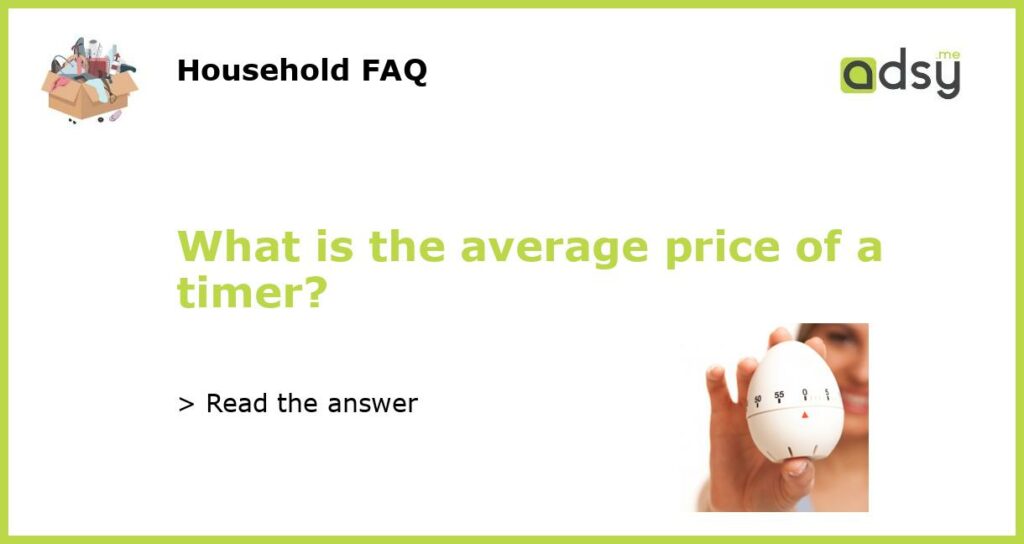Price variations for timers
Timers are essential tools for various purposes, from cooking and workouts to productivity and games. However, the price of a timer can vary significantly based on a range of factors, including brand, features, quality, and complexity. In this article, we will explore the average price of timers across different categories and provide insights into what contributes to these price variations.
The price range for basic kitchen timers
Basic kitchen timers are a common household item that allows you to set a specific time for cooking, baking, or any other culinary activities. These entry-level timers typically offer simple functionality, such as countdown or count-up features, and are easy to use.
When it comes to basic kitchen timers, you can find a wide range of options available at various price points. At the lower end of the spectrum, you can find simple kitchen timers starting as low as $5 or less. These timers often come in generic brands and offer the most basic functionality.
On the other hand, if you are looking for a more established brand or additional features like magnetic backs or digital displays, the price can range from $10 to $20. These mid-range options usually offer better durability and enhanced functionality compared to the lower-priced alternatives.
For individuals who are willing to invest in higher-quality kitchen timers with advanced features, such as multiple timers, pre-programmed settings, and smartphone connectivity, the price can go beyond $20. These high-end timers can range from $30 to $50 or even more, depending on the brand and features.
Timing devices for professional use
Professionals in various industries often require more advanced timing devices with specialized features and precision. For example, in photography, timers are used for controlling exposure time, and in sports, timers are used to time races or training sessions.
The price of professional timing devices can vary significantly based on the complexity and specific requirements of each industry. Basic professional timers typically come at a higher price point compared to basic kitchen timers, starting around $50 and ranging up to $200.
On the other hand, advanced timing devices used in demanding industries, such as scientific research or professional athletics, can cost several hundred dollars or even thousands. These devices often feature high precision, multiple timing functions, and additional accessories to cater to the specific needs of the users.
It’s worth noting that while the price range for professional timing devices might seem steep, the features and reliability they offer can be of great value to those who require precise and accurate timing in their work or activities.
Factors influencing the price of timers
Several factors contribute to the price variations of timers across different categories:
1. Brand reputation: Established brands with a reputation for quality and reliability often command higher prices compared to lesser-known or generic brands.
2. Features and functionality: Timers with advanced features, such as multiple timers, remote control capabilities, or smart connectivity, usually come at a higher price point.
3. Build quality and durability: Higher-priced timers tend to offer better build quality and durability, ensuring longevity and reliability over time.
4. Precision and accuracy: Timers that require high precision and accuracy, like those used in professional settings, often come at a higher price due to the advanced technology and calibration required.
5. Additional accessories and warranty: Some timers come with additional accessories or extended warranty coverage, which can contribute to higher prices.
Where to buy timers at the best prices
When purchasing a timer, it’s essential to compare prices and options across different retailers to ensure you get the best deal. Here are some popular options:
1. Physical retail stores: Major department stores, home improvement stores, and kitchenware stores often carry a variety of timers at different price points. It’s advisable to check their offerings and compare prices before making a decision.
2. Online marketplaces: Online marketplaces like Amazon and eBay provide a wide range of options and competitive pricing. Make sure to check user reviews, ratings, and seller reputation before making a purchase.
3. Specialty stores: Depending on your specific requirements, specialty stores catering to industries like photography, sports, or scientific research may offer a selection of timers designed for professional use.
Remember to consider factors such as product reviews, return policies, and shipping costs when comparing prices across different platforms to ensure you get the best value for your money.






